Do you want to take your consultancy services to the next level? Then, chatbot implementation for consultants is the solution.
Chatbots, computer programs designed to simulate conversation, have emerged as indispensable tools for consultants. According to Gartner, 40% of consulting firms are already using chatbots.
Consultants use chatbots to automate tasks and provide instant responses. These virtual assistants can handle inquiries, schedule appointments, and offer information.
By integrating chatbots, consultants enhance client interactions. They save time, improve efficiency, and boost customer satisfaction.
According to Comm100, chatbots are more satisfied than live chats with humans. On average, the satisfaction rate for chatbots is around 87.58%.
Chatbots are invaluable for consultants seeking to streamline services and enhance client experiences. However, implementing a chatbot for consultants might pose some challenges to beginners.
But not to worry! This article will discuss a step-by-step guide to implementing chatbots for consultants.
Why Implement Chatbots in Consultancy Services?
Picture this: you're a consultant with a growing client base, and your phone is constantly buzzing with inquiries, appointment requests, and repetitive questions.
It can be overwhelming, right? That's where chatbots come to the rescue!
Let's explore why implementing chatbots in your consultancy services is a game-changer.
Enhancing Customer Experience and Engagement
One of the key reasons to implement chatbots is to enhance the overall customer experience.
Chatbots provide instant responses to questions, 24/7 availability, and personalized interactions.
They can handle multiple conversations simultaneously, ensuring no client is left waiting.
Chatbots can significantly improve customer satisfaction and engagement by offering prompt and efficient support.
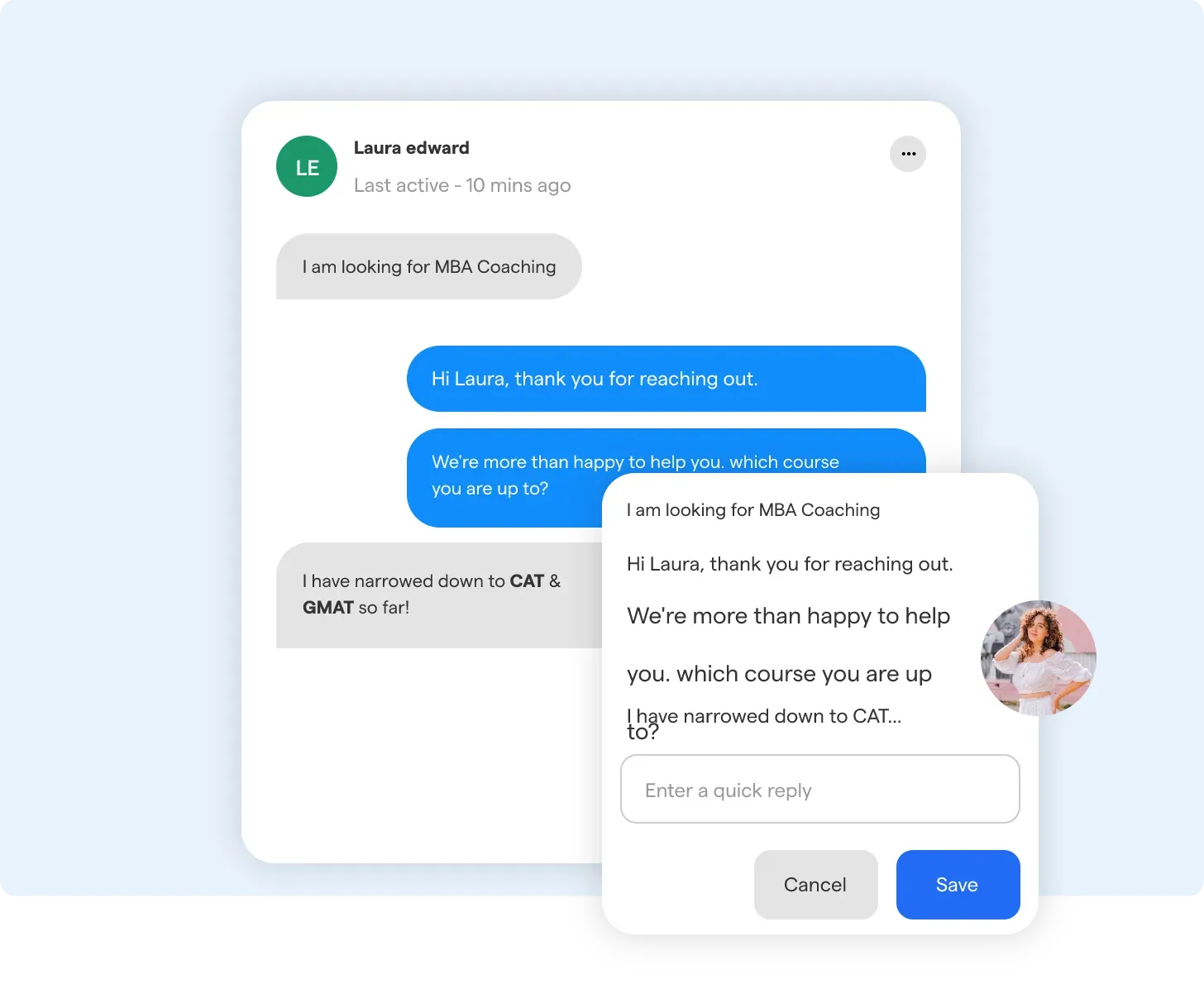
Improving Efficiency and Productivity
As a consultant, your time is valuable. Chatbots can help you streamline your operations and free up your schedule.
By automating repetitive tasks and answering common queries, chatbots allow you to focus on more complex and strategic aspects of your consultancy services.
It improves your productivity and enables you to serve more clients effectively.
Reducing Response Time and Increasing Availability
In today's fast-paced world, clients expect quick responses. With chatbots, you can provide instant replies to inquiries, even outside of your regular working hours.
By reducing response time, you demonstrate your commitment to excellent customer service. Moreover, chatbots ensure that your consultancy services are available round the clock, catering to clients in different time zones.
Like BotPenguin chatbot has a response time of less than 2 seconds.
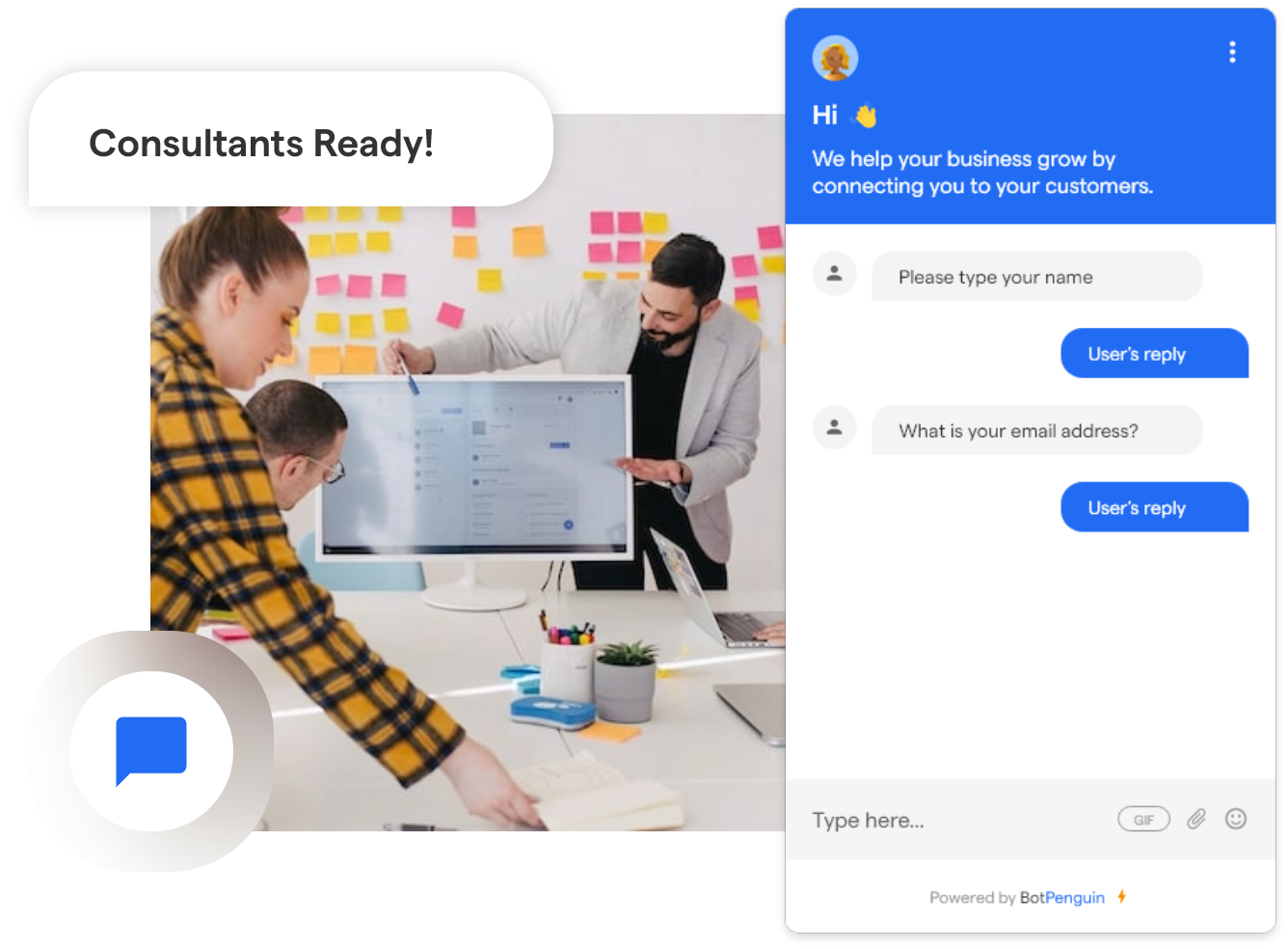
Gaining Valuable Insights and Data Analytics
Data is the new gold, and chatbots are excellent data collectors.
Chatbots can offer valuable insights into customer preferences, pain spots, and frequently asked topics by examining conversations and user interactions. You may use this data to spot patterns, enhance offerings, and make informed decisions.
Chatbots provide you with a wealth of information at your fingertips.
Who Can Benefit from Chatbots in Consultancy Services?
In this section, let's explore who can benefit the most from implementing them in consultancy services.
Management Consultants
Management consultants often deal with many clients and complex business challenges.
Chatbots can assist in gathering initial information from clients, scheduling appointments, and providing basic recommendations. It allows management consultants to focus on in-depth analysis and strategic planning.
Financial Consultants
Financial consultants handle sensitive financial information and provide personalized advice.
Chatbots can help gather client financial data securely, answer common financial queries, and provide essential financial planning tips. It enables financial consultants to focus on complex financial analysis and tailored recommendations.
Human Resources Consultants
Human resources consultants deal with employee-related issues and guide HR policies.
Chatbots, like BotPenguin, can help in answering common HR questions. It can provide information on company policies and assist with employee onboarding processes.
It frees HR consultants' time to focus on complex employee relations and strategic HR initiatives.
Marketing Consultants
Marketing consultants work with clients to develop effective marketing strategies.
Chatbots can assist in collecting client marketing goals, providing initial marketing recommendations, and answering common marketing queries. It allows marketing consultants to focus on creating comprehensive marketing plans and executing targeted campaigns.
Legal Consultants
Legal consultants handle legal matters and provide legal advice to clients.
Chatbots can assist in gathering initial legal information, answering common legal queries, and providing essential legal guidance. It allows legal consultants to focus on in-depth legal research. It also assists in drafting legal documents and representing clients in complex legal cases.
BotPenguin Chatbot provides a legal consultants Chatbot template. This template allows your customers to book consultations, book appointments, and acquire legal services in a few clicks.
And the tech for BotPenguin just doesn't stop there. It makes sure that you reach your customers where they are by offering chatbots for multiple platforms, thus making omnichannel support look easy:
- WhatsApp Chatbot
- Facebook Chatbot
- WordPress Chatbot
- Telegram Chatbot
- Website Chatbot
- Squarespace Chatbot
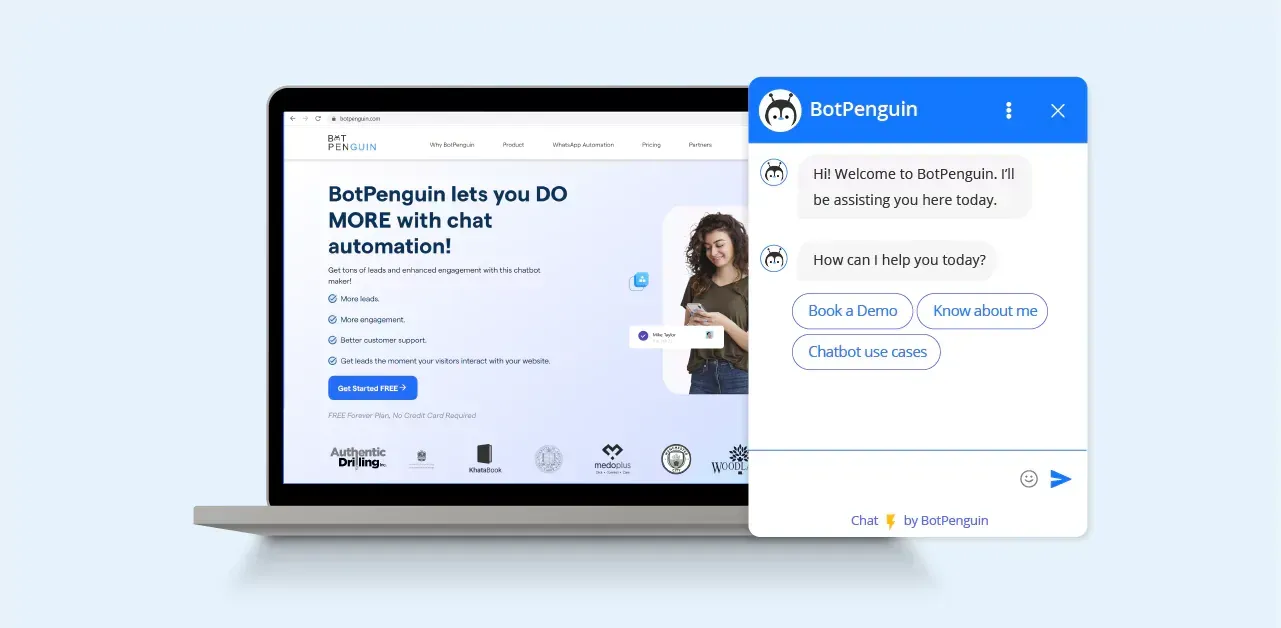
When to Implement Chatbots in Consultancy Services?
Knowing the right time to implement chatbots in your consultancy services is crucial for a successful integration. Let's explore the factors to consider when deciding when to implement chatbots.
Identifying the Need for Chatbots
The first step is identifying the need for chatbots in your consultancy services.
Are you experiencing a high volume of inquiries? Do you have trouble responding to client inquiries promptly?
It's time to consider introducing chatbots if the answer to even one of these questions is yes.
Evaluating the Readiness of the Consultancy Firm
Before diving into chatbot implementation, it's essential to evaluate the readiness of your consultancy firm. Check your current systems, processes, and infrastructure.
Make sure that your workforce is flexible and willing to adopt new technologies. Chatbots can be practical tools but need a conducive environment to succeed.
Considering the Target Audience and Their Preferences
Understanding your target audience and users' preferences is crucial when implementing chatbots. Are your clients tech-savvy and open to using chatbots? Do they prefer self-service options or personalized interactions?
Conduct market research in your field and gather feedback from your clients. Doing this can provide valuable insights into their expectations and help you tailor your chatbot implementation accordingly.
Assessing the Scalability and Long-Term Benefits
Chatbot implementation should be viewed as a long-term investment. Consider the scalability of your consultancy services and how chatbots can support your growth.
Will chatbots be able to handle an increasing number of clients and inquiries? Consider the potential long-term advantages, such as increased productivity, cost savings, and client happiness.
It's evident that now is the ideal moment to use chatbots if the advantages outweigh the initial cost.
Suggested Reading:
Benefits of Chatbots for Consultants: Exploring Key Features
Choosing the Right Chatbot for Consultants
It's time to select the ideal chatbot for your consultancy services now that you've decided to use them. Let's get started with a thorough guide to assist you in making a decision.
Understanding the Different Types of Chatbots
There are many different sorts of chatbots, each with advantages and disadvantages.
Rule-based chatbots are appropriate for straightforward and structured interactions since they adhere to specified rules. On the other hand, AI-powered chatbots employ machine learning and NLP to comprehend and reply to user inquiries.
Choose a chatbot type that complements your consulting services after evaluating your needs.
Assessing the Specific Requirements of Consultancy Services
Every consultancy firm has unique requirements. Consider the specific needs of your consultancy services when choosing a chatbot.
Do you need a chatbot to handle appointment scheduling, provide essential information, or offer personalized recommendations? Make a list of the functionalities and features required in a chatbot to ensure it meets your consultancy service needs.
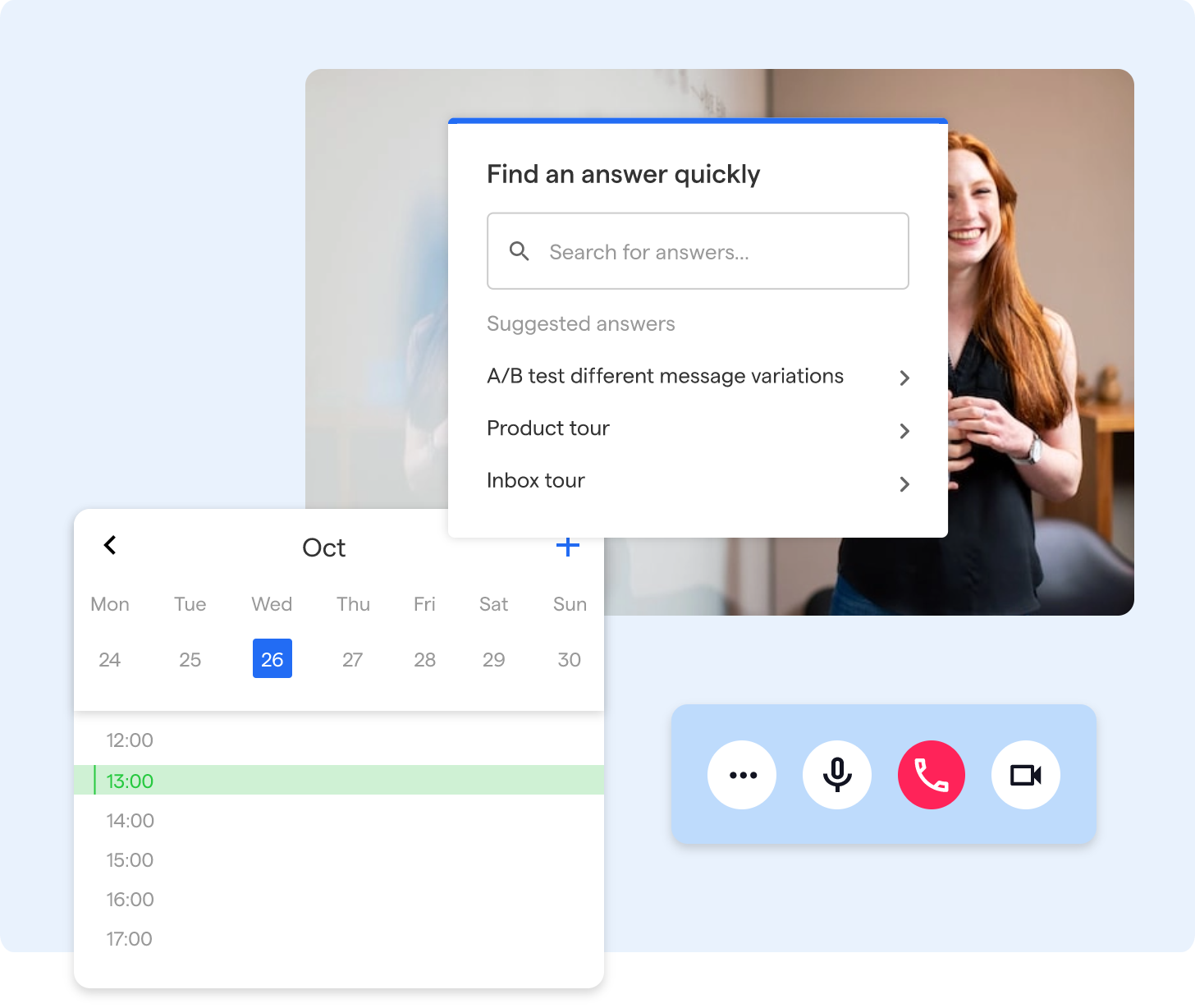
Evaluating Chatbot Platforms and Providers
There are numerous chatbot platforms and providers available in the market. Investigate and compare several solutions based on usability, customizability, integration potential, and cost structures.
Look for platforms with simple-to-use interfaces, robust analytics, and seamless system interaction.
Considering Customization and Integration Capabilities
Customization is essential to ensure that your chatbot is consistent with your consultancy brand and offers a tailored experience to your clients.
Look for chatbot platforms that let you alter the chatbot's appearance, voice, and responses. To ensure a seamless UX, consider the chatbot platform's integration possibilities with your existing Customer Relationship Management (CRM), website, or other systems.
Reviewing Pricing Models and Support Options
Pricing models and support options vary among chatbot platforms and providers. Consider your budget and choose a pricing model that suits your consultancy firm's financial capabilities.
Additionally, assess the support provided by the chatbot platform or provider. Look for options that offer reliable customer support, documentation, and training resources to assist you throughout the implementation process.
Suggested Reading:
How to Implement Chatbots in Consultancy Services: Step-by-Step Guide
Implementing chatbots in consultancy services can significantly enhance client interactions, streamline processes, and improve efficiency. Here is a step-by-step guide to help you successfully implement chatbots in your consultancy services.
Step 1
Define Your Objectives and Use Cases
Before diving into chatbot implementation, clearly defining your objectives and use cases is crucial.
Understand Your Goals and Use Cases
Take the time to understand your consultancy's unique goals and use cases. Are you looking to automate repetitive tasks, provide instant client support, or improve lead generation?
You can tailor the chatbot implementation to meet your consultancy's needs by identifying your specific objectives.
Identify the Key Pain Points and Challenges
Identify and consider the pain points and challenges your clients often face when interacting with your consultancy. Are they struggling to find relevant information, experiencing delayed response times, or facing difficulty scheduling appointments?
Understanding these pain points will help you design a chatbot that effectively addresses these issues.
Step 2
Choose the Right Chatbot Platform
Selecting the right chatbot platform is crucial for a successful implementation.
Research Different Chatbot Platforms
Explore chatbot platforms and compare their features, user interface, and integration capabilities.
Look for platforms that offer effortless customization, scalability, and support for natural language processing (NLP) capabilities. And BotPenguin offers it all.
Consider Your Budget and Technical Requirements
Evaluate the cost of implementing a chatbot and consider your consultancy's budget. Additionally, assess your technical requirements, such as integration with existing CRM systems or knowledge bases, to ensure seamless operation.
Evaluate the Features and Customization Options
Look for chatbot platforms that offer a wide range of features and customization options. Consider features like natural language understanding (NLU), integration with CRM and knowledge bases, appointment scheduling, multi-channel support, and analytics capabilities.
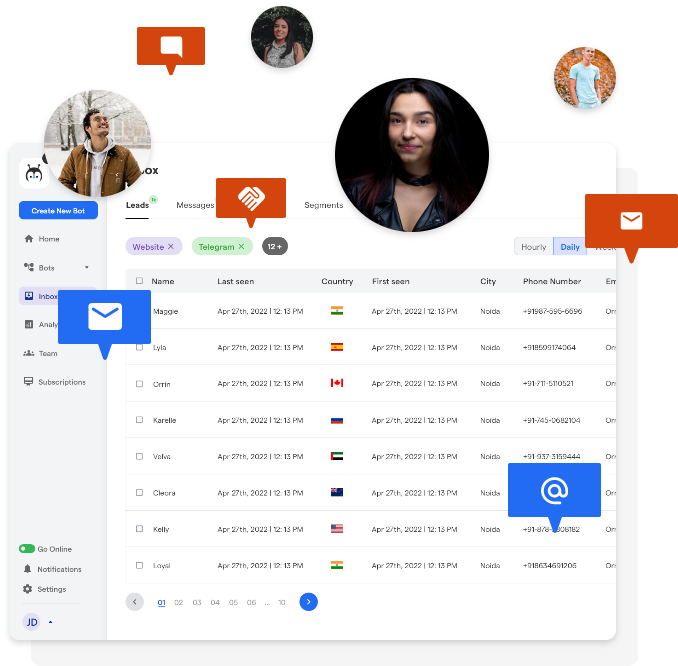
Step 3
Design the Chatbot Conversation Flow
Designing an adequate conversation flow is essential for a successful chatbot implementation.
Determine the User Journey and Desired Interactions
Map out the new customer journey on your website or application. Then, identify the key touchpoints where the chatbot will interact with clients. Consider the different scenarios and questions clients may have during their interactions with the chatbot.
Create a Natural Language Understanding (NLU) Model
Develop a robust Natural Language Understanding (NLU) model that enables the chatbot to understand and interpret user queries accurately. Train the chatbot with relevant data and scenarios to improve its understanding and response capabilities.
Draft the Chatbot Dialogues and Responses
Craft engaging and informative dialogues for the chatbot. Ensure the responses align with your consultancy's tone and brand voice. Test the dialogues to ensure they provide accurate and helpful information to clients.
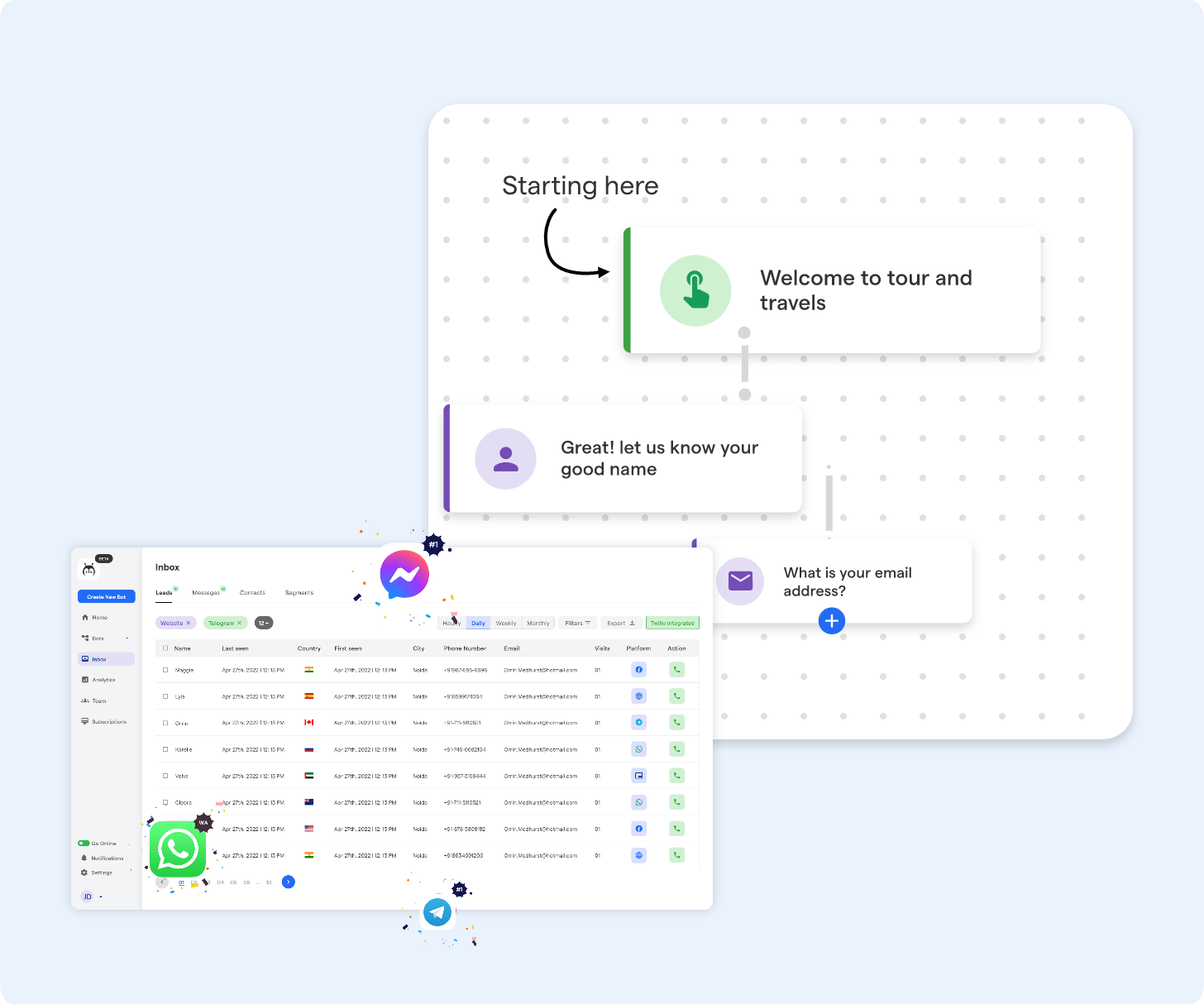
Step 4
Develop and Train the Chatbot
Once the conversation flow is designed, developing and training the chatbot is time.
Build the Chatbot Backend and Integration
Develop the chatbot backend using the chosen platform. Integrate the chatbot with your CRM system, knowledge base, and other relevant tools to provide seamless access to client information and resources.
Train the Chatbot with Relevant Data and Scenarios
Train the chatbot using real-world data and scenarios to improve its understanding and response capabilities. Continuously update and refine the training data to enhance the chatbot's performance.
Test and Refine the Chatbot's Responses
Thoroughly test the chatbot's responses to ensure accuracy and effectiveness. Gather feedback from daily users and make necessary adjustments to improve the chatbot's performance.
Step 5
Integrate the Chatbot into Your Consultancy Services
After developing and testing the chatbot, it's time to integrate it into your consultancy services.
Choose the Right Channels for Deployment
Identify the channels where your clients will most likely interact with the chatbot. Deploy the chatbot on your website, mobile app, or social media platforms to provide convenient access to clients.
Customize the Chatbot's Appearance and Branding
Ensure the chatbot's appearance and branding align with your consultancy's visual identity. Customize the chatbot's interface, colors, and logo to create a seamless user experience.
Monitor and Analyze the Chatbot's Performance
Regularly monitor and analyze the chatbot's performance using analytics tools. Track user interactions, customer engagement levels, and conversion rates. Use this informative data to identify areas for improvement and optimize the chatbot's performance.
What Features and Functionalities Should a Chatbot for Consultants Have?
When implementing a chatbot for consultancy services, it's essential to consider the features and functionalities that will enhance the user experience and provide value to your clients. Here are some key features to look for:
Natural Language Processing (NLP) Capabilities
A chatbot with strong NLP capabilities can understand and interpret user queries accurately. It allows for more effective and efficient interactions with clients.
Understand and Interpret User Queries
The chatbot should be able to understand the intent behind user queries and provide relevant responses. It should be capable of handling complex questions and providing accurate information.
Provide Accurate and Relevant Responses
The chatbot should deliver accurate and up-to-date information to clients. It should be able to retrieve data from your CRM system or knowledge base to provide relevant answers to client queries.
Integration with CRM and Knowledge Base
Integrating the chatbot with your CRM system and knowledge base allows seamless access to client information and resources.
Access Client Information and History
The chatbot should have access to client information stored in your CRM system. It enables personalized interactions and allows the chatbot to provide tailored recommendations and advice.
Retrieve Relevant Knowledge Base Articles
The chatbot should be able to retrieve relevant articles or resources from your knowledge base. It helps clients find the information they need quickly and easily.
Appointment Scheduling and Calendar Integration
A chatbot that can handle appointment scheduling and integrate with consultants' calendars can streamline the booking process and improve efficiency.
Book Appointments and Manage Schedules
The chatbot should be able to schedule appointments with clients based on consultants' availability. It should also send reminders and notifications to both clients and consultants.
Sync with Consultants' Calendars
Integrating the chatbot with consultants' calendars ensures that appointments are scheduled without conflicts. It helps consultants manage their schedules effectively.
Conclusion
Implementing chatbots in consultancy services offers numerous benefits. It includes handling multiple conversations simultaneously, providing instant responses, and collecting valuable data for analysis.
Consultants can benefit from chatbots by automating repetitive tasks, providing instant client support, and improving lead generation. To successfully implement chatbots, it is essential to identify the need for chatbots, evaluate the readiness of the consultancy firm, and consider the target audience's preferences.
Additionally, it is essential to understand the goals and use cases to identify key pain points and challenges. Then, choose the proper channels for deployment, customize the chatbot's appearance and functionality, and ensure seamless transition between channels.
BotPenguin offers cutting-edge chatbot solutions tailored for consultants, transforming client interactions. These intelligent chatbots automate appointment scheduling, answer FAQs, and provide instant information about services.
Consultants benefit from seamless lead generation, improved customer engagement, and efficient client management. BotPenguin's user-friendly interface allows consultants to design personalized chatbots without coding, ensuring a hassle-free setup.
By handling routine queries, these chatbots save time, enhance productivity, and foster client satisfaction. Consultants can focus on core tasks while BotPenguin chatbots handle inquiries 24/7, boosting efficiency, client trust, and business growth.
By embracing chatbot technology, consultancy services can enhance efficiency, improve client satisfaction, and stay ahead in the competitive landscape.
Frequently Asked Questions (FAQs)
What is a chatbot, and how can it benefit consultants?
A chatbot is an AI-powered software that can simulate human-like conversations. It can benefit consultants by automating repetitive tasks, providing instant client support, and improving overall efficiency.
What are the critical steps involved in implementing a chatbot for consultants?
The key steps include:
Defining objectives and use cases.
Choosing the right chatbot platform.
Designing the conversation flow.
Training the chatbot with relevant data.
Integrating it into consultancy services.
How do I choose the right chatbot platform for my consultancy?
To choose the right chatbot platform, consider features, customization options, pricing, compatibility with existing systems, and technical requirements.
What are the challenges in implementing chatbots for consultants?
Common challenges include understanding complex queries, maintaining personalization, handling sensitive information, and building client trust.
How can I train a chatbot for consultants effectively?
Practical training involves:
Gathering relevant data.
Creating training examples.
Using natural language processing techniques.
Continuously improving the chatbot based on user feedback.


